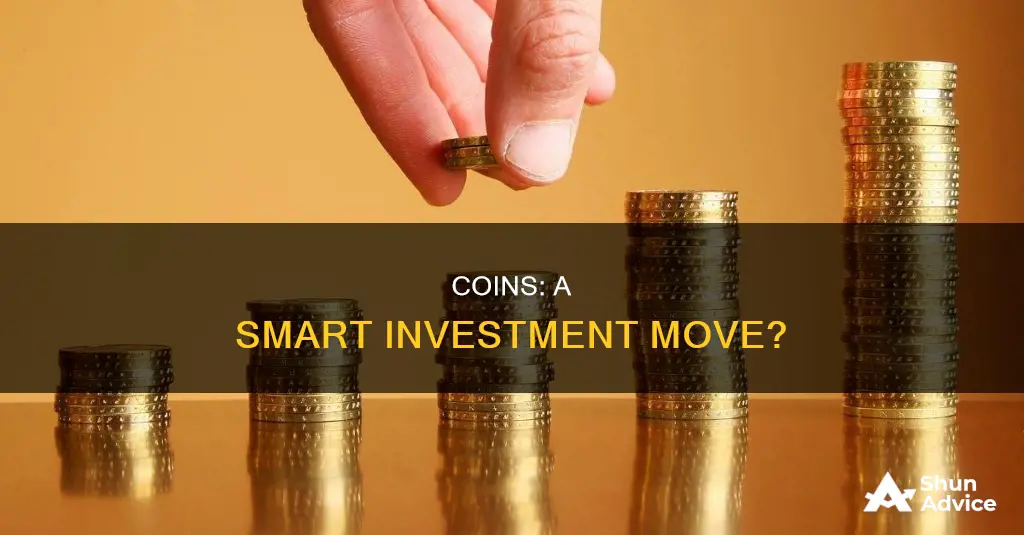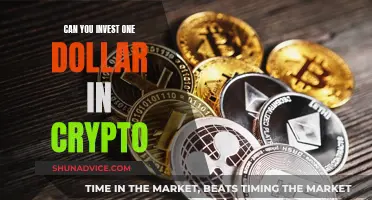
Coins can be a good investment, but it depends on several factors. Firstly, the value of a coin is influenced by its physical metal content, also known as its bullion value. Precious metals like gold and silver are considered good investments as they can rise in value over time. Secondly, the age and rarity of a coin impact its value. Older coins are more likely to have been melted down or worn, making them rarer and more valuable. Finally, the condition of a coin is important. Coins in near-perfect condition are more desirable to collectors and can command higher prices. While investing in coins can be lucrative, it is crucial to do your research, understand the market, and be aware of potential risks such as fraud or price fluctuations.
| Characteristics | Values |
|---|---|
| Age | The older the coin, the more valuable it is. |
| Rarity | The rarer the coin, the more valuable it is. |
| Metal Amount | Coins with higher amounts of precious metals are more valuable. |
| Bullion Value | The bullion value of a coin is calculated by multiplying the number of ounces of metal in a coin by the spot price per ounce of that metal. |
| Collector Value | A coin's collector value depends on buyer sentiment. The fewer examples of a coin that were minted, the higher its collector value is likely to be. |
| Condition | A coin in near-perfect condition will be valued higher than a coin that has been circulated. |
| Grading | Grading standards vary, but very fine distinctions between coins will make a big difference in their worth. |
| Subjectivity | The value of a coin is highly subjective and dependent on buyer sentiment. |
| Market Fluctuations | The rare coin market can be volatile and fluctuate with demand and economic uncertainty. |
| Long-Term Investment | Rare coins are a good long-term investment but are not ideal for short-term profits. |
| Diversification | Coins can be a good way to diversify an investment portfolio. |
| Risk | Any investment has inherent risk, and coin collecting is no different. |
What You'll Learn

Coins as Bullion vs Numismatics
There are two types of coins available: bullion and numismatic. Bullion coins are purchased for their precious metal content, whereas numismatic coins are sought for their rarity and not as much for their actual metal content.
Bullion coins are often available for much less than numismatic coins. They are a good investment if you are looking for a safe, secure future. The value of bullion coins is based on the spot price of the precious metal they contain. For example, the value of a bullion coin made of gold will be based on the spot price of gold. The same goes for silver or any other precious metal.
Numismatic coins, on the other hand, are considered rare or valuable because of factors such as historical significance, unique markings, or minting errors. The value of numismatic coins is based on collector demand and can be many times higher than the spot price of the metal they contain. For example, a 1907 $20 St. Gaudens, High Relief Double Eagle gold coin can be worth 500 times the spot price of gold due to its rarity.
When deciding whether to invest in bullion or numismatic coins, it is important to consider your goals. If you are looking for a stable investment with a lower risk, bullion coins may be a better option. If you are willing to take on more risk and are interested in the collector's value of coins, then numismatic coins may be the right choice. It is also worth noting that the market for numismatic coins is less liquid than the market for bullion coins, so finding buyers or sellers may be more challenging.
In summary, bullion coins are a good option if you are looking for a safe, secure investment based on the value of the precious metal they contain. Numismatic coins, on the other hand, are a better choice if you are interested in the collector's value and are willing to take on more risk.
Building a Bitcoin Investment Website: A Comprehensive Guide
You may want to see also

Factors that Determine a Coin's Value
Several factors determine the value of a coin. Here are some of the most important ones:
Age and Rarity
The older a coin is, the more valuable it tends to be. This is partly due to the metals used to create them and their historical value. The harder a coin is to find, the more valuable it is. For example, some old Roman coins made of common metals are not as valuable as rarer gold coins from Ancient Persia or Macedonia.
Metal Amount and Purity
The amount and purity of the metal contained in a coin can also affect its value. For example, U.S. pennies minted before 1983 are mostly made of copper, while newer pennies are mainly composed of zinc and are less valuable to collectors. Gold and silver coins, such as those from the Royal Canadian Mint, can also rise in value as the price of precious metals increases.
Condition
The condition of a coin plays a significant role in its value, with uncirculated or mint state coins generally being more valuable than circulated coins. Buyers who value coins for their numismatic appeal tend to pay higher prices for coins in better condition.
Supply and Demand
The supply and demand for a particular type or date of coin can also influence its value. Marketing campaigns by coin dealers, changes in the economy, and the actions of collectors can all impact the demand for certain coins, causing their prices to fluctuate.
Intrinsic Metal Value
If a coin is made from a precious metal such as gold or silver, its intrinsic metal value can be a major factor in determining its overall value. As the price of these metals rises and falls, so too can the value of the coins.
A Guide to Investing in Litecoin Cryptocurrency
You may want to see also

Pros and Cons of Investing in Rare Coins
Investing in rare coins can be a profitable and stable option, but it also has its downsides. Here are some of the pros and cons to consider:
Pros:
- Diversification: Rare coins can add diversity to an investment portfolio focused on stocks and bonds. They are a good way to reduce risk and protect your wealth.
- Stable Investment: Rare coins have historically shown stability, with very little record of dramatic price shifts. This is partly due to their large collector base, which ensures consistent demand.
- Value Appreciation: Rare coins tend to appreciate in value over time. The average appreciation rates are around 10% to 25% annually.
- Tax Advantages: Rare coins are exempt from sales tax and are not taxed until they are sold, even as their value increases.
- Historical and Portable: Rare coins offer a piece of history in a small, portable package. They are a more accessible way to own a tangible piece of history compared to larger antiquities.
- Liquid Asset: Rare coins can be easily sold in many parts of the world, including North and South America, Europe, and the Far East.
- Outperform Other Investments: The rare coin market has outperformed stocks and other financial investments over the years, providing significant profits.
Cons:
- Time and Expertise: Investing in rare coins requires specialized knowledge and time to research and understand the market. Beginners may need guidance from experts or mentors.
- Volatility: The rare coin market can be volatile, with prices fluctuating based on demand, economic conditions, and market sentiment.
- Counterfeit Risk: The risk of counterfeit or altered coins is significant. Beginners may be fooled, so it is crucial to buy only from reputable dealers and ensure coins are certified by trusted grading services.
- Limited Liquidity: Rare coins can be challenging to sell or exchange quickly due to their niche market.
- Storage and Insurance Costs: The ongoing costs of securely storing and insuring a rare coin collection can add up.
- Unpredictable Returns: While rare coins can provide significant profits, there are no guarantees. Returns depend on various factors, and the potential for counterfeit coins adds another layer of uncertainty.
- Management: Rare coins may be susceptible to poor management, natural disasters, or other circumstances that can affect their condition and value.
Overall, investing in rare coins can be a rewarding and profitable venture, but it requires knowledge, patience, and an understanding of the risks involved.
The Bitcoin Investment: Your Portfolio's Worth?
You may want to see also

How to Start Investing in Rare Coins
Investing in rare coins is a great way to diversify your portfolio and can be a profitable venture when done right. Here are some steps to help you get started:
Understand the Basics:
Before investing, it's important to understand the basics of tangible asset investments and the coin market. Learn about the factors that influence coin values, such as age, rarity, metal content, and historical significance. Know the difference between coins as bullion (valued for their metal content) and numismatic coins (valued for their collector's value).
Specialize Your Collection:
Choose a specific area of focus, such as a particular time period, denomination, or theme. This could be ancient coins, coins from a specific country or region, or coins featuring a certain theme. Specializing will help you build a more valuable and focused collection.
Educate Yourself:
Study and gain expertise in the field of numismatics. Read books, join coin clubs, attend coin shows, and consult reputable online resources. Learn about coin grading, minting errors, and how to identify quality coins. "Buy the book before the coin" is a popular saying in the coin collecting world, emphasizing the importance of education before investing.
Find a Mentor:
Consider finding a mentor or an experienced coin collector who can guide you through the process. They can provide valuable insights and help you avoid common pitfalls. Their knowledge and connections in the field can be invaluable as you build your collection.
Start with Small Investments:
When starting out, focus on smaller investments rather than high-priced or large quantities of coins. Look for coins within your budget that fit your collection's theme and have potential for growth in value. As a beginner, it's important to gain experience and build your knowledge before making significant investments.
Deal with Reputable Sources:
Only buy coins from reputable coin dealers and ensure the coins are certified by professional coin grading services such as Professional Coin Grading Service (PCGS) or Numismatic Guaranty Corporation (NGC). This will help protect you from counterfeit or altered coins and ensure the authenticity and quality of your purchases.
Scrutinize Your Purchases:
Don't buy coins randomly. Carefully examine each coin you consider for your collection to ensure it meets your quality standards and fits within the direction of your collection. Remember, even subtle differences in appearance can make a big difference in a coin's value.
Keep Records:
Maintain detailed records of your coin purchases, including receipts, grading certificates, and any other relevant documentation. This will help you keep track of your investments, prove authenticity, and provide valuable information if you decide to sell.
Remember, investing in rare coins requires patience and a long-term vision. It's important to enjoy the process and treat it as a hobby, even as you aim for financial returns. By following these steps, you'll be well on your way to becoming a successful rare coin investor.
Bitcoin Investment: How Much Should You Put In?
You may want to see also

Risks of Investing in Coins
Like any other type of investment, there are inherent risks involved in investing in coins. The value of coins is influenced by a range of factors, and while they can be a profitable investment, there are no guarantees. Here are some key risks to consider:
- Market Fluctuations: The rare coin market can be volatile and fluctuate significantly, similar to the stock market. Coin prices are largely determined by supply and demand, and a decrease in demand for a particular coin can lead to a crash in its value.
- Subjectivity and Complexity: The numismatics market, which deals with collectible coins, is complex and illiquid. The value of these coins is influenced by intangible factors such as age, rarity, year of issue, design, and mint. These factors are highly subjective and can lead to significant variations in coin values.
- Scams and Counterfeits: The numismatics market is prone to deceptive marketing and scams. Some sellers may overstate the value of their coins or charge excessive premiums. Additionally, there is a risk of encountering counterfeit or altered coins, which can be challenging for beginners to detect.
- Resale Challenges: Bullion coins, which derive their value primarily from their precious metal content, are generally more liquid and have a better resale market than numismatic coins. Finding buyers for numismatic coins at a desired price can be difficult due to the specialized nature of the market and the varying grades and conditions of coins.
- Time and Expertise: Investing in rare coins requires time and expertise to make wise investment decisions. Beginners may need to rely on reputable experts and dealers for guidance, and it can take time to develop the knowledge and confidence to navigate the market effectively.
- Grading Subjectivity: While grading services have helped standardize the evaluation of coins, there is still subjectivity in the grading process. Different grading services may assign varying grades to the same coin, and even experts can disagree on the grading of a particular coin. This subjectivity can impact the value of an investment.
- Short-Term Profit Challenges: Rare coin investing is typically not ideal for short-term profits. It requires patience and a long-term perspective to see significant gains. Strategies aiming for quick returns, such as coin flipping, can be risky and may result in losses.
Investing in Dogecoin: How Much Is Enough?
You may want to see also
Frequently asked questions
The value of a coin is determined by two principal sources: the physical metal contained in the coin, also known as its bullion value, and its collector or numismatic value. The bullion value of a coin can be calculated by multiplying the number of ounces of metal in a coin by the spot price per ounce of that metal. The collector value of a coin depends on buyer sentiment and is influenced by factors such as rarity, age, condition, and historical value.
Any investment carries inherent risks, and coin collecting is no exception. The value of coins can fluctuate due to changes in the precious metals market or shifts in demand for particular coins. Additionally, the subjective nature of coin grading and the potential for fraud or counterfeit coins can impact the value of an investment. It is important to do thorough research and consult reputable sources and experts when investing in coins.
Beginners should consider specializing their investment selection by choosing a specific theme, denomination, or time period to focus on. It is also important to scrutinize each addition to your collection, studying the value, rarity, and other relevant factors. Starting with a small investment and seeking guidance from reputable dealers and associations, such as the American Numismatic Association (ANA), can help beginners make more informed decisions.







